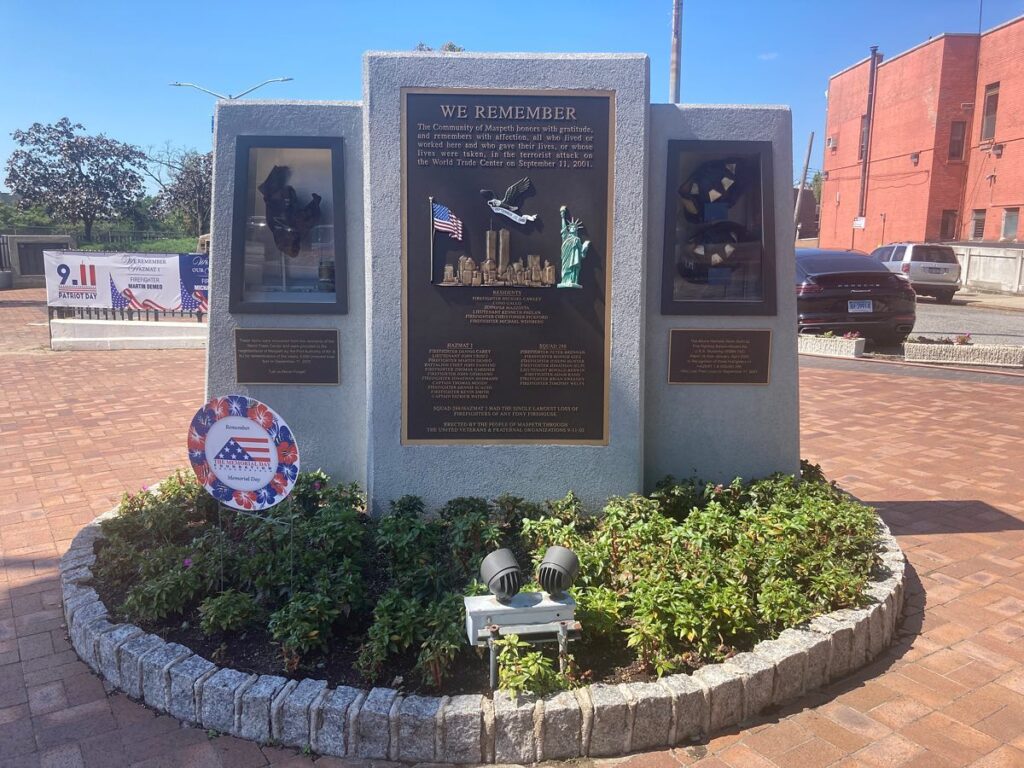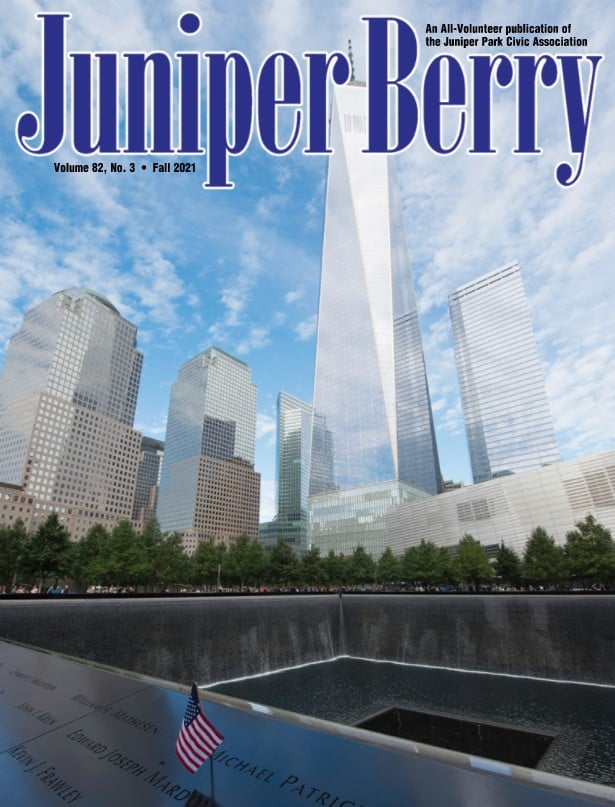Twenty years ago, on September 11, 2001, I walked past PS58 in Maspeth, which was under construction at the time, on the way to IS73 to hand out palm cards on behalf of a friend of mine who was running in a City Council primary. We volunteers started at 6am and after about 2 hours we were told by a custodian at the school that he heard on the radio that a small plane had hit one of the buildings of the World Trade Center. As we were chattering amongst ourselves in the wake of that news, he soon returned to tell us that a second plane had hit the other WTC building, “likely because the draft from the first one had sucked it in,” according to a radio analysis. He relayed that he could see the entire scene from the roof of the school and that it looked really bad.
Realizing that what was happening in lower Manhattan was far more important than handing out campaign literature, I abandoned my post to walk down to Maspeth Memorial Square where people had started to gather. I saw that the top of one of the WTC buildings was a column of dark grey billowing smoke and about half of the other looked the same. It was then that those of us standing there realized that this was no “small plane accident.” We watched HazMat 1/Squad 288 leave the firehouse and head toward the carnage, never realizing that the men on those trucks would perish within minutes.
I returned to the school, still confused about what was going on. I had a headphone in one ear and was listening to news reports when it was announced that two other planes had been hijacked and crashed in Washington, DC and in Pennsylvania. Suddenly and shockingly, we were told by a reporter in a helicopter that one of the WTC towers had collapsed. A few minutes later, the other was also gone. It was unfathomably horrifying.
A female student was in the schoolyard crying uncontrollably because her sister worked inside the WTC. She provided her sister’s cell number and the adults present tried to reach her, but all of the phones were getting nothing but busy signals. (The girl later found out that her sister was safe.) My campaign companion was concerned about his daughter who also worked at the WTC, but he soon found out that she heard about the first strike before she exited the subway, turned right around and had made it safely back home. One thing that became quite apparent was that the ever-present plane traffic in the skies above us had come to an abrupt halt. We were there for about 5 hours when we got word that the election was called off. I was dreading passing the plaza again and seeing that there were no towers standing. The sight of black smoke filling the hole in the skyline where two familiar skyscrapers were mere hours before was both numbing and terrifying.
Instead of heading straight home, I stopped at my grandparents’ house. They had the TV on and because the antenna at the top of the WTC had been destroyed, the only channel they were able to receive was CBS 2 as they were not wired for cable. I was trying to come to grips with what was transpiring when images of ash-covered people and wreckage flashed across the screen. My grandfather, a WWII combat veteran with first-hand hellhole experience, said matter-of-factly, “That’s what war looks like.” Those were words I will never forget.
I only lived a block away at the time, so I headed home with my head spinning, thinking the end of days was upon us. I turned cable news on and watched footage of people jumping from the WTC to avoid dying in an inferno. I didn’t want to watch but on the other hand I didn’t shut it off because I wanted answers as to who did this and why. What I was witnessing was too much for me to process and I am still not sure whether I fell asleep or passed out. I woke up on my couch thinking it was the craziest dream I had ever had, but the TV was still on and the reality of what had happened was unfolding right in front of me. Not knowing what else to do, I went back to visit my grandparents.
My uncle, who lives in Suffolk County, was working in lower Manhattan and was one of the thousands that walked over the East River crossings to the relative safety of Brooklyn and Queens. He trudged all the way to my grandparents’ house, arriving thoroughly exhausted. He gave us the rundown of what he had experienced before my aunt arrived to pick him up. We bid each other a good night, not knowing what the following day would bring.
On September 12, most people who worked in Manhattan had their days cancelled, but health care workers like me were expected to report for duty. The trains were running, and I boarded an eerily empty Manhattan-bound 7 train with a heavy heart and nervous stomach. A panhandler approached me and I tersely told him if I was going to donate to anyone it would be the families of the people at the bottom of the rubble. He backed off. As the train hurtled across Queens, I could see the dark plume rising from Ground Zero. No one at work could really concentrate on their jobs and we talked quietly about everything that had unfolded the day before. During lunch, I walked toward Central Park and was stopped by Scandinavian tourists who were looking for a Red Cross location where they might donate blood. Once I got to the park, I remember feeling angry at the throngs of people who seemed to be enjoying themselves, playing frisbee and sunbathing as if it were a holiday.
Post-9/11, just about every house was flying an American flag. At times, it felt like we had just won a war instead of having had one declared on us. There were calls for our government to strike back, and it did – less than one month after the terror attacks on American soil. As bodies were recovered from the wreckage over the next few months, there was a never-ending stream of funerals. No matter where you went, telephone poles, business windows and front lawns were plastered with posters featuring images of those who would never return home alive. You could not escape the new reality for a second. Visible from the window of my apartment was a streak of sick-colored smoke from the debris pile that wafted over Maspeth whenever the wind shifted direction. I remembered feeling sad at the thought that this would likely be the defining event of my generation.
On the morning of the rescheduled primary election, I made a return trip to IS73. As I passed the future PS58, I handed out some American flag stickers on behalf of the campaign. The workers thanked me as they affixed them to their hardhats. That school was later dedicated as the “School of Heroes” in honor of the first responders that perished on 9/11. Over the ensuing decade, streets around town were co-named after the 9/11 victims who lived on them, and a beautiful monument was installed at the center of the very square where I stood and watched the horror unfold.
The first anniversary was painful for most and every year there is concern of a repeat attack. But law enforcement, always on high alert, has generally kept us safe. Transportation is what keeps our city going and on 9/11 I take comfort in hearing the planes fly above and seeing the subways run.
Last summer, I received word that a “pop-up” bicycle gathering was taking place outside the School of Heroes to protest – I swear I am not making this up – the presence of an NYPD emblem displayed on the wall among those of the other first responders. This happened shortly after a group of dopes ran through town ripping flags off private homes and setting them on fire. After all of this stupidity I no longer felt sad that my generation was defined by 9/11, but rather that subsequent generations are in danger of developing into something so ridiculous, knee-jerk reactionary and incredibly lame.
In 2001, a group of Americans, realizing they were about to die but determined to protect their country, mustered up the courage to overpower terrorists in order to crash their plane down in a field in Pennsylvania so it wouldn’t make it to Washington, DC. That same day, seventy-one members of law enforcement lost their lives while attempting to rescue civilians. Twenty years later, a relatively small group of those Americans who are too young to remember the sacrifices of 9/11, is triggered over the very thought of police and the sight of American flags. We don’t help the situation by electing leaders who think it is their job to vilify members of law enforcement instead of support them. Two decades after the day that changed everything, the biggest threat to our democracy is no longer foreign terrorists but rather our sad, broken culture.
Those of us old enough to remember the events of September 11, 2001 will continue to honor those we lost and celebrate the heroes of that day. We are faced with the undeniable reality of a future that will certainly be filled with many more deaths caused by Ground Zero exposure. We cannot allow the sacrifices of selfless fellow Americans to have been in vain now or in years to come. Writer and philosopher George Santayana famously said, “Those who cannot remember the past are condemned to repeat it.”
In honor of those we lost, light a candle, say a prayer, thank a first responder and above all, teach your children about 9/11.



